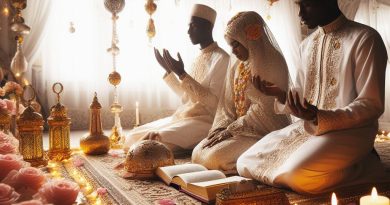Exploring Hebrews 13:4: The Sanctity of Marriage in Nigeria
Last Updated on November 6, 2023
Introduction
Marriage is a sacred institution that holds immense significance in Nigerian culture.
Its importance cannot be overstated as it forms the foundation of society and family units.
Nigeria, like many other countries, faces challenges in maintaining the sanctity of marriage.
However, by understanding and exploring the teachings of Hebrews 13:4, we can gain valuable insights.
This verse states, “Marriage should be honored by all, and the marriage bed kept pure.”
It emphasizes the sanctity and purity that should be upheld within the boundaries of matrimony.
Nigeria, being a country with diverse cultural practices, faces unique challenges in preserving the sanctity of marriage.
For instance, the prevalence of polygamy and divorce rates pose significant threats to the institution.
By examining the cultural context and societal pressures, we can understand the importance of addressing these issues.
Moreover, the sanctity of marriage impacts various aspects of Nigerian society, such as child-rearing and community stability.
Strengthening the institution of marriage in Nigeria requires collective efforts from religious leaders, policymakers, and individuals.
By upholding the sanctity of marriage, Nigeria can strive towards a healthier and more prosperous society.
In the upcoming sections of this blog, we will delve deeper into the challenges faced and potential solutions for preserving the sanctity of marriage in Nigeria.
Background on marriage in Nigeria
- Traditional cultural values and practices
- Influence of religion on marriage
- Changes and challenges in modern Nigerian society
Marriage holds significant importance in Nigerian culture, being deeply rooted in the country’s traditional cultural values and practices.
Traditional cultural values and practices
In Nigerian society, marriage is seen as a sacred union between a man and a woman and is highly valued.
It is considered a lifelong commitment and is expected to be entered into with utmost seriousness.
The traditional cultural values and practices surrounding marriage often vary among different ethnic groups in Nigeria.
But some commonly observed customs include elaborate wedding ceremonies, payment of bride price, and the involvement of extended family members in the marriage process.
Marriage is an important institution for procreation and the continuation of lineage in Nigerian culture. It is not only about the union of two individuals but also about the merging of two families.
Influence of religion on marriage
In addition to cultural values, religion plays a significant role in shaping the sanctity of marriage in Nigeria.
The country is predominantly religious, with Islam and Christianity being the two major religions.
In Islamic culture, marriage is considered a religious duty and is highly encouraged.
It is seen as a means of fulfilling one’s religious obligations and establishing a family unit based on Islamic principles.
Christianity, on the other hand, emphasizes the importance of marriage as a sacred covenant between a man and a woman.
It is viewed as a union blessed by God and is expected to be based on love, commitment, and mutual respect.
The influence of religion extends to the wedding ceremonies, which often incorporate religious rites and rituals.
Nigerian couples often seek the blessings of religious leaders and involve their respective religious communities in their marital journey.
Changes and challenges in modern Nigerian society
While traditional cultural values and religious beliefs continue to shape the sanctity of marriage in Nigeria, modern Nigerian society also faces various changes and challenges that affect the institution of marriage.
Urbanization, globalization, and the influence of Western cultures have brought new ideas and attitudes towards marriage.
Concepts such as individualism, gender equality, and personal choice have started to challenge traditional practices.
Furthermore, the rise of social media and technology has also impacted relationships and marriages in Nigeria.
Online dating, long-distance relationships, and virtual communication have become more common, altering the dynamics of courtship and marriage.
Changes in women’s rights and empowerment have also played a role in transforming marital dynamics.
Women are increasingly pursuing education, careers, and financial independence, which has led to shifts in traditional gender roles within marriages.
Moreover, the high rate of divorce and marital conflicts in modern Nigerian society poses significant challenges to the sanctity of marriage.
Economic pressures, infidelity, and domestic violence are just some of the issues that couples may face.
In fact, marriage in Nigeria is deeply influenced by traditional cultural values and religious beliefs.
However, the institution of marriage faces challenges and changes in the modern Nigerian society, which require adaptation and reevaluation of traditional practices.
Explaining Hebrews 13:4
Context and significance of the passage
- Hebrews 13:4 is a verse from the New Testament that discusses the sanctity of marriage.
- It is important to analyze this passage in its historical and biblical context to fully understand its significance.
- The book of Hebrews is an epistle written to Jewish Christians who were facing persecution and struggling to remain faithful.
Interpretation of “the bed undefiled” phrase
- The phrase “the bed undefiled” refers to the purity and holiness of the marriage covenant.
- In the biblical context, the bed symbolizes the intimate relationship between a husband and wife.
- This phrase implies that within the boundaries of marriage, sexual relations are honorable and pleasing to God.
- It emphasizes the importance of maintaining sexual purity within the marital union.
Understanding the concept of “fornicators and adulterers”
- In Hebrews 13:4, the author warns against the sins of fornication and adultery.
- Fornication refers to any sexual activity outside of marriage, including premarital sex and extramarital affairs.
- Adultery specifically refers to sexual relations between a married person and someone other than their spouse.
- The author condemns these acts as they violate the sanctity of marriage and go against God’s design for human relationships.
List of key points
- Hebrews 13:4 discusses the sanctity of marriage within the biblical context.
- The phrase “the bed undefiled” emphasizes the purity and holiness of the marital relationship.
- Sexual relations are considered honorable and pleasing to God within the boundaries of marriage.
- Fornication refers to all forms of sexual activity outside of marriage.
- Adultery specifically denotes sexual relations between a married person and someone other than their spouse.
- Both fornication and adultery violate the sanctity of marriage and go against God’s design.
- Understanding the context and meaning of Hebrews 13:4 is crucial in upholding the sanctity of marriage.
In essence, Hebrews 13:4 highlights the sanctity and purity of the marital relationship.
The phrase “the bed undefiled” stresses the importance of maintaining sexual purity within marriage.
The passage condemns fornication and adultery as they violate the sacredness of marriage.
By understanding the context and significance of Hebrews 13:4, we can appreciate the biblical teachings on the sanctity of marriage and strive to uphold its principles.
It is essential for individuals and society to recognize the value of fidelity and commitment within the marriage covenant.
Read: Foundations of a Godly Marriage: Biblical Insights
The Sanctity of Marriage in Nigerian Culture
Traditional views on marriage as a sacred union
- The concept of marriage is deeply rooted in the Nigerian culture.
- Marriage is considered a sacred union between a man and a woman.
- It is seen as a lifelong commitment and a foundation for building a family.
- The sanctity of marriage is highly valued and respected in Nigerian society.
- Traditional practices and customs play a significant role in maintaining the sanctity of marriage.
- Marriage ceremonies are often elaborate and involve various rituals symbolizing unity and commitment.
- Respecting marital vows and remaining faithful is of utmost importance.
- Infidelity and divorce are frowned upon and considered a betrayal of the sacred union.
- Traditional beliefs emphasize the importance of marital harmony and the well-being of the family.
- Marriage is seen as a means of societal stability and the continuation of cultural heritage.
Role of family influence and societal expectations
- The family plays a crucial role in shaping individuals’ perception of marriage.
- Parents and extended family members have significant influence in the choice of marital partners.
- Arranged marriages were common in the past but are increasingly becoming less prevalent.
- Societal expectations exert pressure on individuals to conform to certain marital norms.
- Early marriages, particularly for women, were the societal expectation in the past.
- However, modernization and education have challenged these norms, allowing more freedom in partner selection.
- Financial stability and compatibility are also key considerations when choosing a life partner.
- The expectations of family and society contribute to the preservation of the sanctity of marriage.
- Marital disputes often involve mediation by family members to ensure reconciliation and maintain the sacred bond.
- Respecting elders and seeking their guidance are considered essential for a successful marriage.
Impact of religious beliefs on the sanctity of marriage
- Religion has a deep influence on the sanctity of marriage in Nigerian culture.
- Christianity and Islam are the dominant religions in Nigeria, each with its own perspectives.
- Both religions emphasize the sacredness of marriage and the commitment between spouses.
- Religious teachings promote fidelity, unity, and the importance of a strong family unit.
- Marriage is seen as a covenant with God, and divorce is discouraged except in extreme circumstances.
- Religious leaders play a crucial role in counseling couples and resolving marital conflicts.
- Prayer and faith are seen as important factors in maintaining a healthy and thriving marriage.
- Religious ceremonies, such as church weddings and Islamic Nikah, further reinforce the sanctity of marriage.
- Despite modern challenges, religious beliefs continue to uphold the sanctity of marriage in Nigerian society.
- Religious communities offer support and guidance to couples, ensuring the preservation of marriage as sacred.
In general, the sanctity of marriage is deeply ingrained in Nigerian culture.
Traditional views, influenced by family, societal expectations, and religious beliefs, shape the perception of marriage.
The sacred union is seen as a lifelong commitment and the foundation for building a family.
Upholding marital vows, maintaining fidelity, and seeking communal support are essential to preserving the sanctity of marriage in Nigerian society.
Read: Benefits of a God-Centered Marriage: Insights from Hebrews 13:4

Factors Affecting the Sanctity of Marriage in Nigeria
In Nigeria, the sanctity of marriage is facing various challenges that threaten its stability and longevity.
Several factors contribute to these challenges:
Rise in Divorce Rates and Marital Dissatisfaction
- Increasing divorce rates indicate a decline in the sanctity of marriage in Nigeria.
- Marital dissatisfaction is a key factor leading to divorce and undermining marriage sanctity.
- Issues like infidelity, communication breakdown, and domestic violence contribute to marital dissatisfaction.
- Lack of conflict resolution skills and emotional disconnect further weaken the sanctity of marriage.
Influence of Globalization and Changing Societal Norms
- Globalization has brought about cultural changes that challenge traditional Nigerian marital values.
- Influences from Western cultures promote individualism over collectivism, affecting marital commitment.
- Changing societal norms, such as acceptance of cohabitation, weaken the sanctity of marriage ideals.
- Western media’s portrayal of marriage contributes to unrealistic expectations and dissatisfaction.
Economic and Financial Pressures on Marriages
- The worsening Nigerian economy puts significant economic strain on marriages.
- Financial difficulties often lead to conflicts, which erode trust and the sanctity of marriage.
- Unemployment, inadequate income, and poverty levels increase marital tensions and instability.
- Couples’ inability to meet financial responsibilities adds stress and strains the marital bond.
Basically, the sanctity of marriage in Nigeria is affected by several factors that pose significant challenges.
The rise in divorce rates and marital dissatisfaction indicates a decline in the sanctity of marriage.
Globalization and changing societal norms promote individualism and weaken traditional values.
Additionally, economic and financial pressures strain marriages and contribute to marital instability.
Recognizing and addressing these factors is crucial to safeguarding the sanctity of marriage and promoting healthy relationships in Nigeria.
Read: Advice for Newlyweds: Navigating the Journey with Hebrews 13:4
Challenges to the Sanctity of Marriage in Nigeria
Infidelity and Extramarital Affairs
- Infidelity is a major challenge to the sanctity of marriage in Nigeria.
- Many spouses engage in extramarital affairs, causing emotional pain and instability in marriages.
- Lack of trust and communication further exacerbate the problem of infidelity.
- Infidelity not only damages the relationship between spouses but also affects the overall fabric of society.
- It leads to broken families, emotional turmoil, and can even result in divorce.
Polygamy and its Impact on Marital Dynamics
- Polygamy is another significant challenge to the sanctity of marriage in Nigeria.
- Polygamous marriages introduce complexities and difficulties in marital dynamics.
- Sharing a spouse with multiple partners often leads to jealousy, competition, and conflicts.
- It becomes challenging for spouses to give equal attention, emotional support, and love to one another.
- The presence of multiple wives can disrupt unity and stability within the marital relationship.
Domestic Violence and Abuse
- Domestic violence and abuse pose a severe threat to the sanctity of marriage in Nigeria.
- Many spouses, especially women, suffer physical, emotional, and psychological abuse within their marriages.
- Domestic violence not only harms the victim but also has a significant impact on the children involved.
- The cycle of abuse often continues, affecting future generations and perpetuating negative marital patterns.
- It is crucial to address domestic violence and provide support systems to ensure the sanctity of marriage.
Essentially, the sanctity of marriage in Nigeria faces significant challenges.
Infidelity and extramarital affairs, polygamy, and domestic violence are prominent issues that undermine the stability and happiness of marital relationships.
These challenges demand urgent attention and appropriate measures to strengthen and protect the sanctity of marriage in Nigerian society.
Read: Key Bible Verses Celebrating the Sanctity of Marriage
Preserving the sanctity of marriage in Nigeria
Strengthening communication and emotional intimacy
Married couples should prioritize open and honest communication, actively listening to each other’s thoughts and feelings.
Open, honest dialogues foster trust and mutual understanding, ensuring a lasting and meaningful marital bond.
By prioritizing emotional connection and effective communication, couples can fortify their relationships and navigate the challenges that may arise.
Encouraging pre-marital counseling and education
Providing couples with knowledge and guidance before marriage can help them build a strong foundation.
These measures enhance communication and understanding, reducing marital issues.
Couples build stronger foundations, fostering lasting relationships. Society benefits from healthier, happier marriages.
Couples must embrace these opportunities.
Promoting gender equality and mutual respect in marriages
Both partners should be treated with equal respect and have equal rights within the marriage.
By emphasizing shared decision-making and equal rights, marriages can become more harmonious and resilient.
Encouraging open dialogues and empathy helps bridge gaps, strengthening the foundation of successful and sacred unions.
Promoting respect for each partner’s autonomy and views nurtures healthier, more enduring marriages.
The sanctity of marriage is preserved through active engagement in dismantling gender stereotypes and supporting equitable partnerships in Nigeria.
Conclusion
Recap of key points discussed in the blog post
Throughout this blog post, we have explored Hebrews 13:4 and its significance in Nigeria.
We have highlighted the challenges faced in upholding the sanctity of marriage in the country, including issues like divorce and infidelity.
It is evident that the institution of marriage is under threat in Nigeria.
Importance of upholding the sanctity of marriage in Nigeria
Upholding the sanctity of marriage is crucial for the stability and progress of Nigerian society.
Marriage is the foundation of the family unit, and strong families contribute to the overall well-being and development of the nation.
By honoring the sanctity of marriage, we can foster stability and build a better future for generations to come.
Call to action for individuals and society as a whole
It is vital for individuals to recognize the significance of marriage and make a commitment to uphold its sanctity.
Couples should prioritize communication, trust, and mutual respect in their relationships.
Society as a whole must provide support and resources to strengthen marriages through counseling, education, and policies that promote family values.
The sanctity of marriage is a crucial aspect of Nigerian society that deserves attention and efforts to preserve.
By recognizing the challenges, understanding the importance, and taking action, we can work towards a society where marriages are cherished and upheld as sacred institutions.
Let us all commit to preserving the sanctity of marriage for a brighter future in Nigeria.


